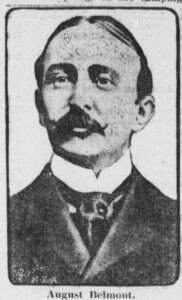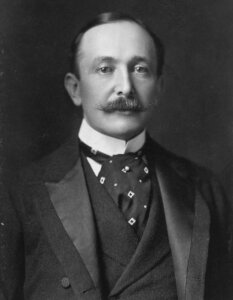The secret Jewish history of the Belmont Stakes
Its Jewish founder and namesake was the inspiration for an ostentatious Edith Wharton character

The field runs out of the starting gate during 154th running of the Belmont Stakes at Belmont Park in 2022. Photo by Sarah Stier/Getty Images
With its mint juleps and fascinator hats, the first leg of the Triple Crown, the Kentucky Derby, embraces the Southern nostalgia many associate with horse racing culture. The last leg — the Belmont Stakes — showcases a different side to the sport.
The Stakes, which will be held on Saturday on Long Island, is sited on land that was farmed in different periods by Sephardic and Ashkenazi Jews dating back to the 17th century. And the race was named after a Jewish immigrant, a social climber whose influence on New York transcended the racetrack.
One biography of the man — there are at least two — calls August Belmont “a rakehell and style-setter who transformed the nature of high society and created the era known as the Gilded Age.” Indeed the more you read about him, the more his namesake race seems like cutting room material. Irving Katz’s 1968 biography, August Belmont: A Political Biography — upon whose research this article depended on — doesn’t mention horse racing at all.

‘Jew bankers’
August Belmont was born Aaron Schonburg in 1813 to descendants of Jews who escaped to Germany during the Spanish Inquisition. In his adolescence, Belmont’s parents secured him an apprenticeship with their relatives through marriage, the Rothschilds, and he rapidly ascended the ranks of their banking empire. In 1837, he earned an important assignment: sailing to Cuba by way of New York to check on Rothschild accounts there.
But upon arriving in New York, Belmont discovered that the Cuba accounts had collapsed. Rather than await direction from his employer, he opted to stay there to establish a satellite banking operation on Wall Street. The bank turned a fortune, and within three years, he was the third-wealthiest man in New York. Still in his mid-twenties, he broke off from the Rothschilds and launched a career in politics.
It did not take long for the enterprising Belmont to become a Democratic party kingmaker — or to suffer the antisemitic slander of his political opponents. He served as ambassador to the Netherlands and consul general of the Austrian empire in New York City. He brokered international trade deals and proposed a plan to annex Cuba to President James Buchanan. When he settled down, it was to chair the Democratic National Committee.
All the while, Belmont fought off newspaper accusations of “dual allegiance” to the Rothschilds and using “Jew gold” to undercut American democracy. After he became party chairman, The New York Times wrote, “Yes, the great Democratic party has fallen so low that it has to seek a leader in the agent of foreign Jew bankers.”
Trendsetter
The ethnic hatred didn’t scare him away from New York’s fanciest social affairs, nor exclude him from membership in the high profile Union Club. According to biographer David Black in The King of Fifth Avenue, Belmont was the first New Yorker to have a private ballroom, the first to have a private gallery for his art collection, and was responsible for introducing gourmet cooking and French wines to New York. Belmont’s influence spread through high society like a thoroughbred closing down on pole position in the final stretch.

As he achieved social and political power, Belmont was continually dogged by accusations about his character, including persistent rumors that he cheated on his wife with a married woman. This charge drew him into a duel over a lady’s “honor” in 1841, and a gunshot wound sustained in that duel caused him to walk with a limp the rest of his life. The ostentatious, philandering character of Julius Beaufort in Edith Wharton’s 1920 novel The Age of Innocence is said to be based on Belmont.
Ever the social influencer, August Belmont’s most enduring legacy would come through his connection with Leonard Jerome, a stock market speculator who (with his pal’s help) poured his wealth into building a racetrack in the Bronx. The inaugural Belmont Stakes were held at Jerome Park Racetrack in 1867 for a grand prize of $1,850. The race moved to Belmont Park, which was built by August Belmont, Jr., and opened in 1905. (Today, the Belmont Stakes purse is $1.5 million.)
The 1.5-mile Belmont Stakes has been won by a Jewish jockey only once — Walter Blum in 1967. But when American Pharoah became the most recent Triple Crown winner in 2015, the horse’s owner was another Jewish immigrant — Ahmed Zayat, an Egyptian American businessman with his own reputation for flamboyance and controversy.
Listen to That Jewish News Show, a smart and thoughtful look at the week in Jewish news from the journalists at the Forward, now available on Apple and Spotify:
The Forward is free to read, but it isn’t free to produce

I hope you appreciated this article. Before you go, I’d like to ask you to please support the Forward.
Now more than ever, American Jews need independent news they can trust, with reporting driven by truth, not ideology. We serve you, not any ideological agenda.
At a time when other newsrooms are closing or cutting back, the Forward has removed its paywall and invested additional resources to report on the ground from Israel and around the U.S. on the impact of the war, rising antisemitism and polarized discourse.
This is a great time to support independent Jewish journalism you rely on. Make a gift today!
— Rachel Fishman Feddersen, Publisher and CEO
Support our mission to tell the Jewish story fully and fairly.
Most Popular
- 1

Culture Cardinals are Catholic, not Jewish — so why do they all wear yarmulkes?
- 2

Fast Forward Ye debuts ‘Heil Hitler’ music video that includes a sample of a Hitler speech
- 3

News School Israel trip turns ‘terrifying’ for LA students attacked by Israeli teens
- 4

Fast Forward Student suspended for ‘F— the Jews’ video defends himself on antisemitic podcast
In Case You Missed It
-

Yiddish קאָנצערט לכּבֿוד דעם ייִדישן שרײַבער און רעדאַקטאָר באָריס סאַנדלערConcert honoring Yiddish writer and editor Boris Sandler
דער בעל־שׂימחה האָט יאָרן לאַנג געדינט ווי דער רעדאַקטאָר פֿונעם ייִדישן פֿאָרווערטס.
-

Fast Forward Trump’s new pick for surgeon general blames the Nazis for pesticides on our food
-

Fast Forward Jewish feud over Trump escalates with open letter in The New York Times
-

Fast Forward First American pope, Leo XIV, studied under a leader in Jewish-Catholic relations
-
Shop the Forward Store
100% of profits support our journalism
Republish This Story
Please read before republishing
We’re happy to make this story available to republish for free, unless it originated with JTA, Haaretz or another publication (as indicated on the article) and as long as you follow our guidelines.
You must comply with the following:
- Credit the Forward
- Retain our pixel
- Preserve our canonical link in Google search
- Add a noindex tag in Google search
See our full guidelines for more information, and this guide for detail about canonical URLs.
To republish, copy the HTML by clicking on the yellow button to the right; it includes our tracking pixel, all paragraph styles and hyperlinks, the author byline and credit to the Forward. It does not include images; to avoid copyright violations, you must add them manually, following our guidelines. Please email us at [email protected], subject line “republish,” with any questions or to let us know what stories you’re picking up.
















